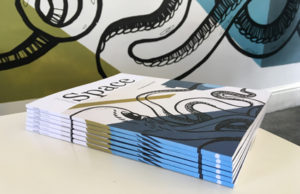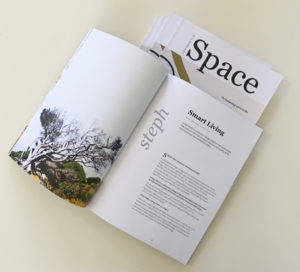fSpace Magazine – Smart Living
_The following is from FREMANTLE Space, the_ fSpace magazine which celebrates the people who have embraced the ethos of small coworking space in the heart of Fremantle.
Smart Living
Words: Sabine Albers, Artwork: TRAM
Living Smart is a behavioural change program that helps people take action in their own homes to improve their quality of life and reduce their environmental impact.
Sabine: How would you introduce yourself?
Dr Stephanie Jennings: I’m Steph and I’m someone who’s decided to live life at a slower pace, a more sustainable pace. A pace that gives me more time to do the things I love, like spending time with my young children, commuting in environmental friendly ways, and enjoying the vibrant community I live in – Fremantle.
I’m a scientist with a focus in energy efficiency and building design and am privileged to be part of Living Smart, a Fremantle not-for-profit that has won national awards and has increased its reach beyond WA.
Living Smart is a behaviour change program that helps people take action to improve their quality of life and reduce their environmental impact.
It’s about connecting people too. It’s about building community, which is hard in this day and age. fSpace is part of that too so that’s a nice cross over.
People who take our courses also meet others who are looking to take action, which creates new friendships.
What makes Living Smart so unique?
There are so many programs out there that people just dip in and dip out, and it barely causes a ripple in their lives. What I love about ours is it really works.
Part of it is we use behavioural psychology to effectively build capacity within individuals to make change. It’s not just about technology – it’s exploring how you live, how you want to live, and what makes you happy.
Within the course there are some traditional education elements, but a lot of time is spent discussing solutions. It’s very interactive, but there’s also time for reflection.
It’s really about moving off the problem and looking at what can we do. There’s no shaming. It’s all about positive actions we can take and every action, large or small, is celebrated.
Living Smart focuses on ten topics that can make a change. What are some key points people can work on?
It gets people to start on whatever point is relevant them. It might be waste, it might be what’s happening in their garden, it might be their own health or improving their home.
You get exposed to the full content of the course and you might be surprised by what you don’t know. With that content, the goal setting and reflection time, you can find a topic that really fires you up, that you can put your energy into.
We share ideas like practical ways to remember to take a bag to the supermarket so you don’t use plastic bags. We also talk about the global waste issue and how together we are making a difference. You don’t feel alone with it.
So the focus is on helping people find a place to start and reminding them that small changes do make a difference.
That’s exactly what it’s about. It’s working out where you want to start or progress to, then taking some fresh actions and seeing that you are not alone. The conversations are very positive.
Due to its broad nature, people typically start with one topic and then it flows onto another. Someone might start by just turning off the tap while they’re brushing their teeth. And then they might start to think about their choice of toothbrush, whether it’s compostable or disposable. And then they might start to look at cleaning products in the bathroom. There’s a lot of flow on things called spillover in terms of behaviours.
Change can be difficult. What can help start to make a change within a community?
Our lives are so busy with so many distractions that a key step is just slowing down and making time to ask the important questions that are often ignored. Questions like are you actually heading where you want to go? What are the things you cherish? Are you giving those things enough time? Are you living the way you want or just dealing with the guilt of not living the way you want?
That’s an example of what people go through on this journey. They may realise that they need to downshift, to simplify their lives, to create some space.
So is looking after the planet also looking after your own health?
It is. Part of the impact on the planet comes from people trying to do a lot and the resource consumption goes with that – doing a lot, driving a lot, consuming a lot. Slower lives have smaller footprints.
I just do what I can to inspire people to tread gently on our planet.


